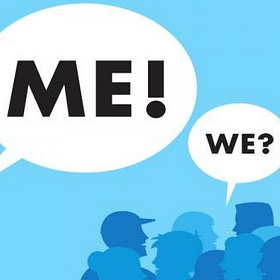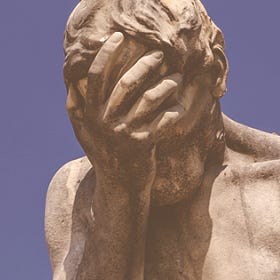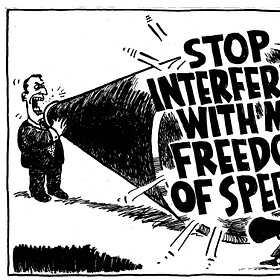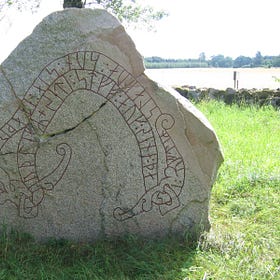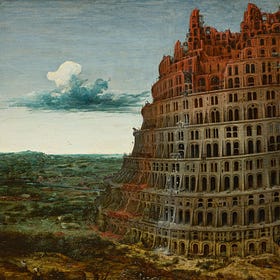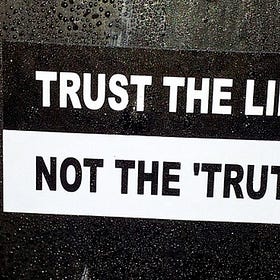Society & Culture
History Deserves Defending
It can be tempting to dismiss historical illiteracy as irrelevant; what does it matter to, for example, an engineer if they can’t recall who James Madison was, or the building of the Berlin Wall? Yet while it may not matter for an individual’s profession, it does matter for society to have an informed citizenry, and their ability to meaningfully contrib…
Covid and the End of the Neoliberal Individual
In the ancient Classical world, every home was a place of worship. The household alter, the lararium, was a hearth fire maintained in homage to the gods, and to the ancestors of that family. The premodern family thus constituted the focal point of religious organisation in society. Consequently, the fundamental unit in society was the family.
Listening from the Distance of Centuries
The title of this essay is taken from a famous quote by the great 19th Century historian, Thomas Carlyle: “Listening from a distance of two Centuries, across the Death-chasms and howling kingdoms of Decay, it is not easy to catch everything.” Carlyle was referring to events that he considered to be catalytic in the emergence of modern Europe: the European…
Iran and the Limits of "Raising Awareness"
For the second time in less than a year, the ideals and values that we supposedly champion - individual freedoms and liberties, political freedoms, and human rights - are under the microscope with the uprising in Iran. But there is one salient distinction; in Iran these are mere concepts, not reality. When Ukraine was invaded, for the third time in less…
A Crisis of Reason
The Enlightenment saw the birth of a new commitment to empiricism as a means of understanding the world, but it was born out of a profound sense of wonder at the natural world. It wanted to examine the world, and our presence in it, through a lens of reason, rationality, and the generation of ideas which could be examined through experimentation in orde…
The Starbucks Effect
In his 1899 ‘Theory of the Leisure Class’, Thorstein Veblen first articulated the theory that human consumerism and consumption could be understood within an evolutionary framework, as representative of social hierarchy. Termed “conspicuous consumption”, Veblen argued that consumer preferences are determined relative to their position in the social hier…
The Desert of the Real
The annual arrival of September 11th always offers a moment to pause, remember, and reflect. The surreality of the tragedy and loss of innocent lives, and the subsequent scale of death and destruction wrought in Iraq and Afghanistan compounded the magnitude of the disaster. For some reason, this year an essay from Slavoj Žižek’s
The Intoxicating Allure of Nostalgia
The father of the contemporary study of nostalgia, Fred Davis, described nostalgia in 1979 as a “deeply social emotion” not only felt as a personal experience but extending into our role as social actors. Davis considered nostalgia to have both private and collective forms; the former as the memories of one’s own personal life, while the latter extended…
A Vacuum of Thought
Whenever I find myself in a thought-stream of existential torrents, I try and peer in and identify the source. With the political, economic, and socio-cultural challenges of our times superimposed over a volatile network of existential risks, from climate disasters to escalating geopolitical conflicts, there is no shortage of torrential mental terrain t…
The Right to Feral Speech
"Freedom of speech." It is hard to avoid coming across a declaration, particularly in the popular press, that freedom of speech is under threat. But what we are witnessing is not, in truth, a debate about free speech. It's a race to the bottom, to the lowest common denominator of reactionary narrative-driven agenda.
In Defence of Books
I was recently referred to a couple of thoughtful essays (‘The Great Forgetting’ by Ruth Gaskovski, and ‘A Pilgrim's Creed’ by Peco), both of which, in different ways, explore how our ability to think, to learn, and to hold memory, are being eroded by our dependence on tech. As we are stripped of our “cognitive liberty” by the insidious screens to which…
The Roots of Our Fragmentation
Jon Kabat-Zinn was the first person, at least that I’ve seen, use the term “dis-ease”; the deftly placed hyphenation diagnosing the malady of our fragmented and alienated times. We have dis-ease within ourselves, our sense of meaning and purpose, and dis-ease with the conglomerate of people around us, the mass that once resembled civil society. And in o…
The Problem of Morality-Justified Motivated Reasoning
There is a paradox of the human condition, which is that at our core we are irrational, emotive creatures who also, through our unique capacities for self-awareness and consciousness, want to be perceived as rational actors. Our default-mode for decision making is a roadmap of cognitive shortcuts; heuristics and gut feelings, conditioned beliefs and mou…
What Will We Leave?
Throughout Scandinavia, numerous testaments to times and lives gone by remain in the form of runestones. The archaeology Professor Neil Price, in his masterful book ‘The Children of Ash and Elm’, details the proliferation of runestones throughout Scandinavia, most of which date back to the late Viking Age period in the 11th Century, but range from the M…
Trivialising Ourselves to Death
The late American critic and writer, Neil Postman, deserves to rank among George Orwell and Aldous Huxley as one of the most prescient thinkers of the direction of our societies and cultures in the 20th Century. In his 1985 book, ‘Amusing Ourselves to Death
AI and the Death of God
A common theme in 3am Thoughts is the persistence of the Enlightenment-Romanticist dialectic in our contemporary culture (see this essay, and this). The Enlightenment commitment to scientific and technological advancement continues to exist in tension with a trepidation of the implications for the world of nature, and the domain of the Self; those realm…
Morality Salience and Our Mass Psychosis
Euphemisms like “political polarisation” do not quite capture with sufficient granularity the level to which we are increasingly unmoored from reality, entrenched in the bunkers of the alternate realities of the internet. We are gripped by a form of mass psychosis, buffered by the virality of groupthink. Our fractured societies have further fragmented i…
Sanitising the Arts Strips them of their Power
In 2008, a student-employee at Indiana-Purdue University in Indianapolis, Keith John Sampson, was accused and found to have committed an act of “racial harassment” by university administrators. Sampson had been reported to the university authorities by co-workers who claimed offence and harassment arising from Sampson reading a book. You have not misrea…
Policing Language is About Controlling Thought
In 1996, an Australian academic at Monash University built a language model known as the “postmodern generator”, to generate text following the language styles of postmodern writers, i.e., the generator would produce sentences that were syntactically correct, but otherwise meaningless gibberish. Here is an example:
The Death of Thinking
That great British humanist-scientist, Humphry Davy, once said in a lecture delivered in 1810: “Nothing is so fatal to the progress of the human mind as to suppose our views of science are ultimate; that there are no mysteries in nature; that our triumphs are complete; and that there are no new worlds to conquer.”
Sufficiently Truth-y Sounding
The American philosopher Harry Frankfurt distinguished between lying and bullshit by reference to regard for the truth. Liars are those who are aware of the truth, or at least their version of it, but deliberately seek to subvert and mask that truth. Bullshitters, on the other hand, are those who have no direct concern for the truth, but seek only to im…
Lost in a Torrent of Noise
In his 2008 essay entitled How to Disagree, Paul Graham wrote: “...though it’s not anger that's driving the increase in disagreement, there’s a danger that the increase in disagreement will make people angrier. Particularly online, where it’s easy to say things you’d never say face to face.”
The Mockery of Mental Health
It seems that there isn’t a serious conversation for which social media is not capable of reducing to a mere caricature of itself. A vortex for the distillation of complex issues into a superficial sea of soundbites. And if anything currently epitomises this distortion of the important into the mundane, it is the conversation around mental health, for m…
The Bloody Pretences of Civilisation
There is a philosophical argument which tends to repeat over time as to whether humans are fundamentally good or bad. Pondering this question has meant navigating some turbulent internal terrain, crashing on the rocks of disdain for our species of, to quote Sheldon Solomon,
American Godhead
Writing in the 8th Century, a monk named Alcuin of York highlighted a central thesis of early Christianity: “Faith must be voluntary not coerced. Converts must be drawn to the faith not forced. A person can be compelled to be baptised yet not believe.”
Oh, How Predictable
It's boring. And I'm over it. “I’ve looked at the data myself.” Oh, well then enthral us with your acumen, random philosophy student. That clip is so painful to watch. There he is, the very epitome of the self-importance and entitlement of contrarian thinkers, flicking through his notes as if he was a peer to a professor with a distinguished career stud…
Ultra-Processed Brain-Food
Forward: The contents of this essay arise from much recent time spent in reflection on these issues, how they arise, the form they take, and how they can be hard to see. In particular, in discussion on pseudo-spirituality I’ve paraphrased a dear friend who has seen this culture not only from the vantage point of an observer on social media, but in relat…
Loose Cultures Cost Lives
Why did Taiwan deal so well with the threat of Covid-19, but the UK failed to act before it was too late? Why did New Zealand respond rapidly, but the US descend into an act of narcissistic self-sabotage which has left over half-a-million citizens dead?
The Inviolability of Ignorance
Understand that there are two ways evidence can be used. The first is the true scientific method; asking a question, forming testable predictions, testing that question, getting an answer, then moving forward with that answer, updating our mental models to incorporate that answer with current knowledge, shaping new questions, then testing them anew. In …
On Truth
Imagine this scenario. We take two people, one male and one female, both from entirely different cultural and religious backgrounds. And we throw them off the roof of a building, at the same time. Don’t worry, we have a big inflatable cushion for them to land on, because we don’t want them to die: we want to ask them both about their experience.
The Paradox of Freedoms
'Tyranny'. To hear that word uttered by people in societies like the US and UK in relation to pandemic measures, escalated by the drive for vaccination, is to know we have entered a realm of fantasy, of detachment from reality. In the US and in the UK, the pandemic has laid bare how the cult of individualism, launched in earnest in the 1980's, has distor…
Low Regard Opinions
"Your best opinions are those you hold in low regard." This line from 'The Little Book of Thinking Big' by Richard Newton encapsulates a way of framing ideas, theories, and beliefs, in a way that renders them open to healthy skepticism, scrutiny, and - dare I say it - perhaps even changing ones mind.



